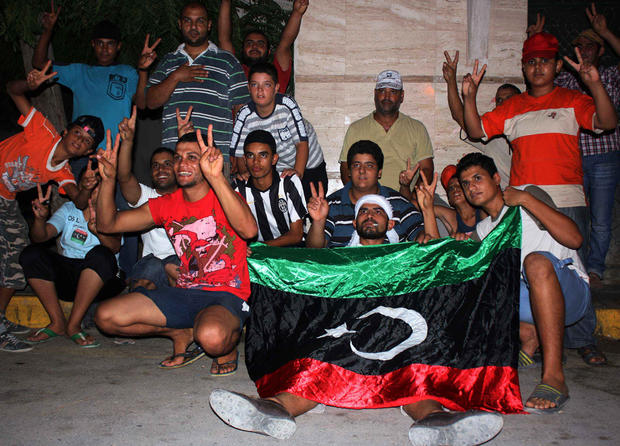Is Libya a victory for Obama?
As Libyan rebels sought to establish control of Tripoli on Monday, with three of strongman Muammar Qaddafi's sons in custody as clashes continue at his longtime command center, some are questioning whether Qaddafi's seemingly imminent downfall should be considered a victory for President Obama.
Some say taking out the brutal and destabilizing regime in North Africa with little U.S. sacrifice vindicates Mr. Obama's strategy (called "leading from behind" by some) which amounted to getting off the ground and supporting a NATO-led mission. Others, meanwhile, are criticizing the president for failing to take more decisive action and failing to topple the Qaddafi regime more swiftly.
Politically, the events there help bolster the president's foreign policy record as he fends off attacks from his Republican rivals. But with the U.S. economy still lagging, it's possible the public may not give a second thought to events abroad.
Democratic strategist Jamal Simmons told Hotsheet the president "still needs to show a lot more leg on trying to fix the economy," but he called the fall of Qaddafi important for the nation and "an unmitigated success for the president."
"He said Qaddafi must go, and despite the short term focus of most American media and pundits, Qaddafi is going without the loss of one American life," Simmons said.
Shadi Hamid, director of research at the Brookings Doha Center, also noted to Hotsheet that Mr. Obama helped avert a humanitarian catastrophe at little expense to the American people, citing estimates that U.S. engagement there cost around $1 billion.
Photos: The battle comes to Tripoli
Complete coverage: Anger in the Arab World
"Obama did the right thing, however belated it was, to intervene in Libya," he said. "I think there was a real concern we were stuck in three quagmires, in Iraq, Afghanistan and Libya -- now we can say, at the very least, one of those wars has a been a relative success."
However, he added, "That doesn't mean Obama's strategy of leading from behind was the right strategy. If anything, I would argue it prolonged the inevitable... The rebels themselves were complaining about [insufficient U.S. support] throughout the process."
Sen. John McCain, R-Ariz., gave a similar critique on CBS' "Face the Nation" on Sunday.
"I grieve a bit because this conflict didn't have to last this long," McCain told CBS' Norah O'Donnell. "The United States' air power could have shortened this conflict dramatically. Unfortunately we chose not to. We led from behind."
Peter Feaver, a political scientist at Duke University who served on the National Security Council staffs of Presidents Bill Clinton and George W. Bush, argues at Foreign Policy magazine that it's too early to declare Mr. Obama's strategy a success, in part because it's unclear what will happen with Qaddafi gone. The National Transitional Council will essentially start from scratch as it aims to build up democratic institutions in Libya, and it's possible attempts at governing could devolve precipitously.
"If the Obama team's planning for post-Qaddafi Libya is up to the task, that will go a long way to vindicating their approach," Feaver writes. "But as the George W. Bush administration ruefully knows, as hard as it is to topple a dictator, the really hard part is what comes after."
Some of the president's supporters argue the administration's limited involvement in Libya will help Libyans as they try to establish a democracy.
"What Obama's intervention accomplished was giving Libyans an opportunity to own the outcome," wrote Steve Clemons, Washington editor at large for The Atlantic magazine. "Obama kept the US military footprint relatively small... This is the same kind of approach that the international community needs to take as Libya takes its next steps."
Regardless of what happens in Libya, the fact remains that the economy is of paramount concern to voters.
A CBS News/New York Times poll revealed in May that Mr. Obama's overall approval rating jumped by an impressive 11 percentage points in the wake of the U.S. military mission that killed Osama bin Laden. Yet by August 4, the president's approval rating was back to 48 percent, largely unchanged from CBS News findings throughout the year.
Meanwhile, Gallup polling from Aug. 8 - 14 showed that Mr. Obama's job approval rating for that week dropped to 40 percent -- the lowest weekly average of his administration. From Aug. 11 - 14, just one in four voters approved of the president's handling of the economy.
Simmons argues that success in Libya will still help the president politically.
"Most Americans aren't focused on foreign policy today but everyone one of these wins undergirds Obama's leadership standing," he said. "The killing of Osama bin Laden, the deaths of terrorists due to drone strikes and the fall of Qaddafi make it hard to marshal a national security argument against President Obama and that removes a major arrow from the Republicans' quiver."
Mr. Obama himself said in an interview which aired yesterday on CBS Sunday Morning that the economy will be one of voters' top priorities. "I expect to be judged a year from now on whether or not things have continued to get better," he said.

